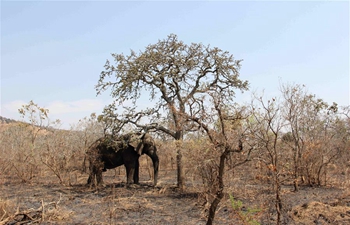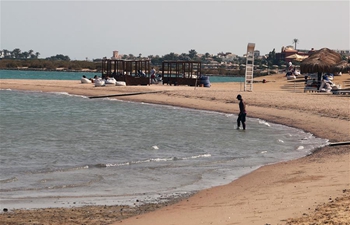MANILA, Sept. 29 (Xinhua) -- At least 31 Filipinos are infected with the human immunodeficiency virus (HIV) each day in the Philippines, government data showed with the Department of Health (DOH) voicing alarm over the spread in the Philippines of HIV that causes acquired immunodeficiency syndrome (AIDS).
Health Secretary Francisco Duque said the number of Filipinos affected by HIV and AIDS "have drastically increased over the last couple of years." "Just over the past decade, the average rate of new HIV cases in the Philippines has grown from one per day to 31 per day. And this figure does not include undocumented cases," Duque said.
Duque said the Philippines currently has the highest percent of increase of new HIV cases in the Asia-Pacific region from 2010 to 2016, at 133 percent. The first case of HIV infection in the Philippines was reported in 1984. Since then, the DOH said there have been 56,275 confirmed HIV cases reported.
The DOH said sexual contact among males who have sex with males (MSM) was the predominant mode of transmission among males with 84 percent accounting for the total transmission, followed by male-female sex at 11 percent, and sharing of infected needles.
"More than anyone else, we, at DOH, take this very seriously, that's why we've decided to partner with people and organizations that will allow us to address the root cause of this growing epidemic," Duque said.
Duque vowed to intensify efforts to combat the epidemic. "The DOH is gearing up for a large-scale battle - one that aims to put a stop to the increasing number of individuals affected by the HIV and AIDS," Duque said.
The DOH recently launched a media blitz, dubbed LHIVE FREE, that will target the youth using modern means to disseminate information about HIV and AIDS, as well as to promote safer sex.
"LHIVE FREE aims to make conversations about the virus a normal thing among today's youth," Duque said, stressing the need "to equip people with the right knowledge" about HIV and AIDS.
"Often times, they are not open to talking about anything that has to do with the disease in general because they see it as something that's very distant from them, when in fact, there's a big chance that someone they know might already be infected by the virus - and there's an even bigger chance that that person infected by the virus is not aware that he or she has it already," Duque said.
As part of its initial wave of initiatives geared towards spreading information and debunking myths about the virus, the DOH launched LHIVE FREE REDVOCATES: The Search for 2018 HIV & AIDS Advocacy Ambassadors. A three-way pageant open to men, women and transwomen aged 20 and above, the search is the first among a series of activities that LHIVE FREE will be spearheading, the DOH said.
"The chosen ambassadors will lend their voices to communicate to the populations who are at risk to HIV and enabling organizations, and help DOH promote the HIV services available in the country," the DOH said.
The DOH is also planning to produce educational video materials that will be disseminated to schools, local institutions, targeted people's organizations, and communities all over the country.
The DOH said there will also be talks and seminars targeting support groups of People Living with HIV, including family members, friends, and other enabling organizations.
"The aim for this is to help create a safe and accepting environment for individuals with the virus, so they will not feel afraid to ask for help or feel condemned," the DOH said.
"We are bringing relevant and updated information to the people, and presenting it to them in a fun and easily understandable way," Duque said.
By doing this, Duque expressed hope that the fresh government campaign "will erase fears, promote safe sex and provide a level of understanding that will open people to the idea of getting themselves tested regularly, and to seek for help, should they test positive of the virus."
"This is just the beginning. Like I mentioned before, we are taking HIV's threat seriously and are looking at every possible means to make sure that we stop this virus in its tracks," Duque added.



















